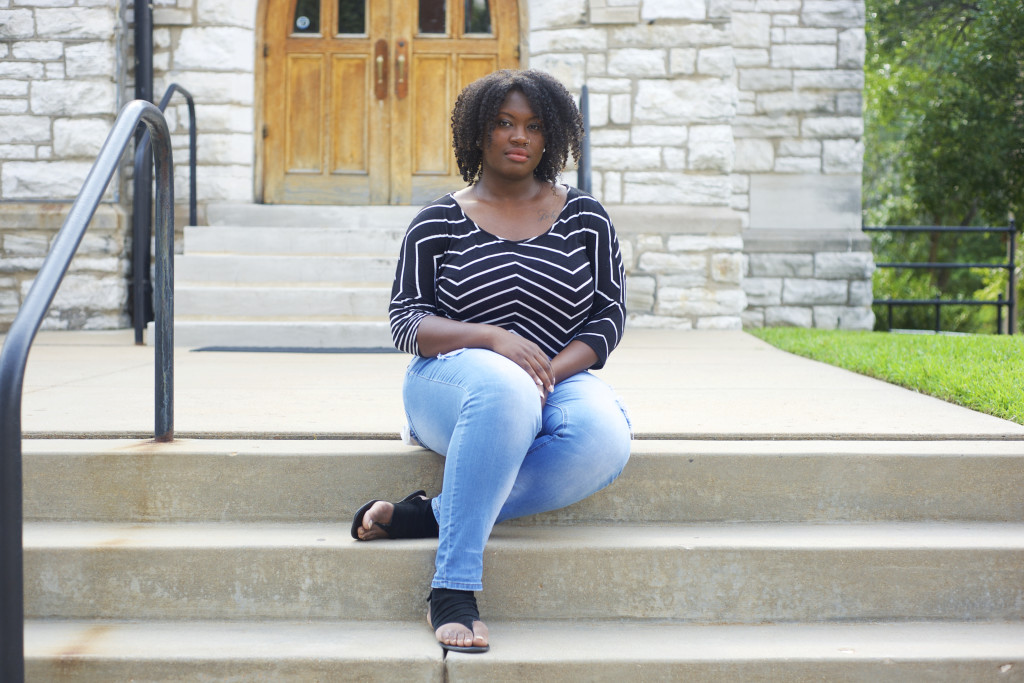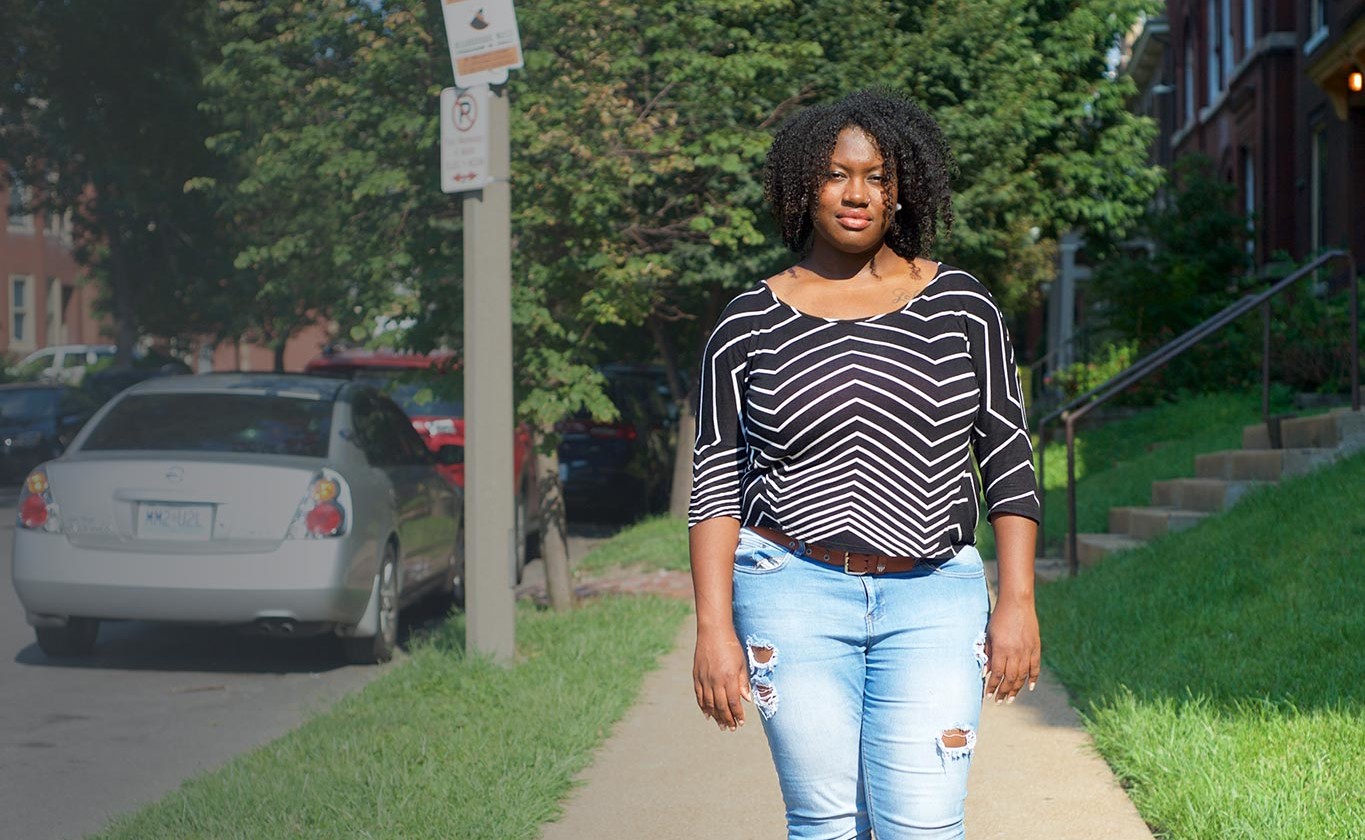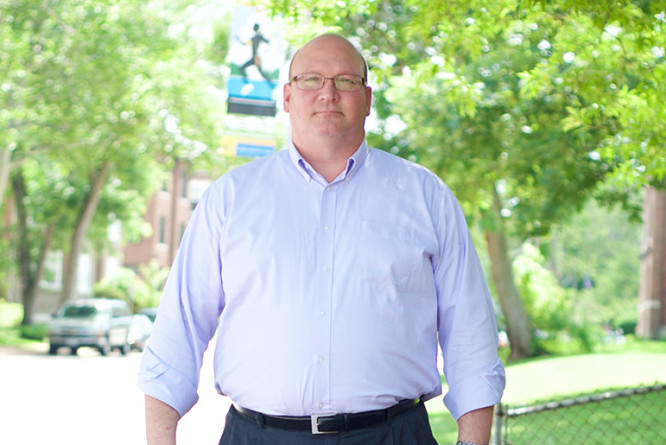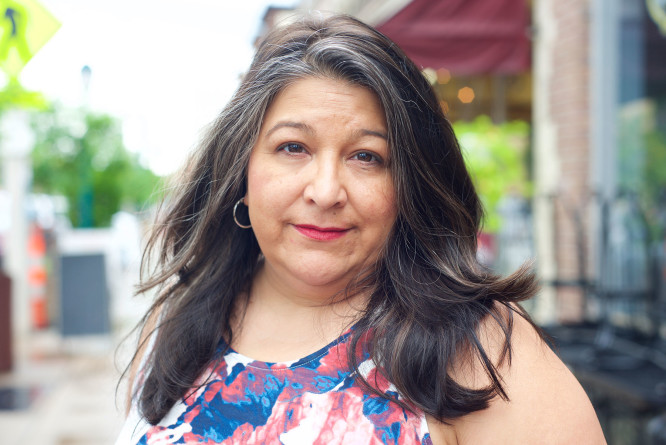Sometimes you take the long route because you don’t want to drive through the municipalities. So you have to leave home early or get somewhere late because you take side roads instead of the main street because you know that that street, in particular, is a hot spot for cops. For me, being poor and not always being able to have your car registered or afford to get certain things done, you know you’re going to get pulled over. There’s no way to avoid it. So you just kind of hope and pray, and it’s a pretty nervous and anxious way to live because you have to get to work or get to school, but you also know you can’t afford to take care of some of the things required for your car. Simply going to school can be scary because you don’t want to get pulled over. You won’t be able to afford to pay the ticket. So you take the chance and hope you don’t get pulled over. But it’s scary that day after day, just trying to go to school, you’re worried about, “Will this be the day I get pulled over? Will this be the day I get caught?”
At one point, I had four warrants because I couldn’t afford to get car insurance, I couldn’t afford to get my car registration, and I couldn’t pay my property taxes. I would end up having to drive illegally because my plates would be expired and I couldn’t do anything about it. So I’d get pulled over and always explain this to the cops because you’d hope that the cop would be understanding. But they would always give you a ticket. Then you can’t afford to pay the ticket because if you could, you would’ve gotten your car taken care of. So you end up not being able to pay the ticket and then you get a warrant.
Once you get into that cycle, it’s really, really hard to get out of because there are a lot of fees. You can try to get a lawyer. Or you can post bond. If you get pulled over and you can’t post bond, you just do time served.
For me, I did end up getting arrested. Luckily I worked at a church that was willing to get me out. I was prepared to stay in jail, be transferred to the different municipalities, and just do time served, which probably would have been weeks because it was several tickets. So I was stuck in that cycle and still working to get out.
I still have two. Better Family Life in an organization that has an amnesty program and they will allow you to get a voucher to go to the courts and pay whatever fine so they will lift the warrant. In my case, I have Maryland Heights and Ferguson left. Maryland Heights actually doesn’t have a fee, so I just have to go up there and get it lifted. But Ferguson, of course, has a fee. So I have to come up with that money which I don’t have and I have about a month to get it done. It’s $100. I could call my family and ask to borrow money, but I won’t end up with $100 at the end of the day because everybody’s trying to make ends meet. So you have to make a choice. Do you pay your car note? Do you pay your car insurance? Do you take care of things you finally got together? Or, do you pay for this warrant and then end up not having car insurance and end up in the cycle all over again because you’re going to get pulled over and you’re going to get another ticket?

Dawn Jones, photos by Lindy Drew
The reality is that the $100 I may have in my bank account has to go to other necessities like rent and food. For me and people like me who come from my background and the communities I come from, we have to make a choice. And, usually, we’re going to choose to eat. We’re not going to starve so we don’t get locked up. Some people have said, “Why not catch the bus?” Maybe I catch the bus to school, but I run the risk of not being able to catch the bus back home. Or maybe I’ll catch the bus to work, but I get off so late that I have to sit at the bus stop for two hours. That’s not safe. It’s easy for someone with a more privileged mind frame or background to say, “Just pay the money,” without taking the time to understand we ain’t got it. Let’s be honest. I don’t have it. It’s frustrating. Especially when people look you in the face and say, “Why not just catch the bus?” or “Just borrow the money.” If those were options, I would’ve done them. So, clearly, it’s not an option.
The way police officers treat us — as citizens, as people, as human beings — is something that needs to be screened better. Consolidating the municipalities won’t change that. They have to actually change the training and screening and look for psychological ways people view specific people of color. But, in my situation with the tickets, I think it would help because I won’t have five tickets and five warrants. I’ll have one. One fee. And that will help because it won’t be a cycle. It’ll be one ticket that you deal with that one time versus five from getting pulled over just going up the street twice because I ran through two different municipalities.
It’s a bit shaming to have to go to different courts to deal with this and to have a fear of being arrested when you’re driving around because you have warrants. Then when you actually get to the courts or try to interact with the courts, some of them are just downright rude and disrespectful. The first thing you do is call and find out, “How much is bond?” You want to know how much you need to pay in order to get the warrant lifted. When I called Ferguson, for example, the lady gave me the fee, which was $200 some-odd dollars to get the warrant lifted. And I asked her, because I didn’t know, “What would the process be if I don’t have the money? And what would the process be if I do have the money?” She basically said, “Well, if you don’t have the money, you’re going to get arrested.” It was very cold and heartless. It was not understanding my situation at all. When I asked her, “What are my options?” She wasn’t helpful with a mad attitude, kind of rude, not answering the question. “Pay us or get arrested,” was the gist of the conversation. No matter how I rephrased the question, no matter how I tried to get more answers, I even said, “Do I need to get a lawyer?” she said, “That would be pointless. It’s just more money you’ll have to pay.”

There are so many people like me and worse who don’t have the opportunity to exercise their voice. There is a name behind their ticket. And there is a story behind our names. So it’s easy to hear about a person who has multiple tickets in multiple municipalities and assume they’re irresponsible or lazy. And, usually, that’s not it. They’re just having a hard time and have no idea how to get out of it. So they get stuck. There are people I know who have seven, eight warrants and they’re stuck because you’re talking about a bond for each warrant that is over $200. You’re talking about $1,000 or more just to get all your warrants taken care of. They don’t have it. We don’t have it. And we’re silent and complain about it at the kitchen table, but it’s time to let everybody know it’s an issue. And unless the people who make decisions, the lawmakers, are willing to make some changes, like consolidation — so instead of eight warrants, it’s one — there are always going to be communities of people stuck in a cycle. It’s time to say something and not be ashamed of it anymore, not be afraid to say, “It’s our reality,” and try to use our voices to make something happen that can change it.
I’m not sitting around waiting for a handout. I’m trying. Growing up in the inner city, I’m trying to be better than what the system says I should be. When it comes to tickets, I’m trying to get them paid off. I’m trying to get them taken care of. I’m fighting. So I want people to know you can’t look at my name, look at my ethnicity, look at the background I grew up in and assume anything about my character, my life, my intelligence. Because I’m fighting every day to be a better me, not a better girl that grew up in the ‘hood, but a better me. Why do I fight for what I fight for? Why do I fight for Black Lives Matter? I think about the generation after me. And if my uncles sat around and talked about municipalities. Or if people got up from their tables and actually went out and demanded change that maybe things could have been a little different for me. Our grandparents and great-grandparents fought for that. And somewhere down the line, we stopped fighting. I wonder if we kept fighting if things could have been different for me. So I fight and I do interviews and I speak because maybe I can change something for my kids or those who are a generation after me so when they’re my age they’re doing a different type of interview.
When it comes to the court system and ticketing and the way it’s done, I would like to see alternatives to tickets because it’s pointless to give a ticket to a family who couldn’t afford to get certain things taken care of on their car. It’s going to go into warrant status and they’re not going to be able to pay it. You’re not doing anything besides making their lives so difficult and stressful when it’s probably difficult enough to make ends meet. I would like to see alternatives. What can we provide to these families instead of a ticket? It may be programs where families can work and do community service and, at the end of that service, their property taxes are taken care of or their plates are renewed or something like that rather than getting a ticket. I want to see the justice system working with the community saying, “This is something we require of you, but I know that right now you can’t do it. So what can we do? How can we work with you to get that taken care of?” Otherwise, the cycle’s going to continue because these are poor people that just don’t have the money.
It’s not just one individual, it’s whole households feeling the impact of that because the mother is taking her children to school or whatever other activities they may have. Even beyond that, it’s affecting the general trust the community has with the court systems where they live. If the expectation is that when you’re caught with something not being right in your car or with you and that you’re going to get a ticket and no one’s going to work with you or care about what you have going on in your home, then why would I trust you? Why am I going to call you when I need you? Because I can’t even trust you to work with me on something as simple as this.





#FwdThruFerguson